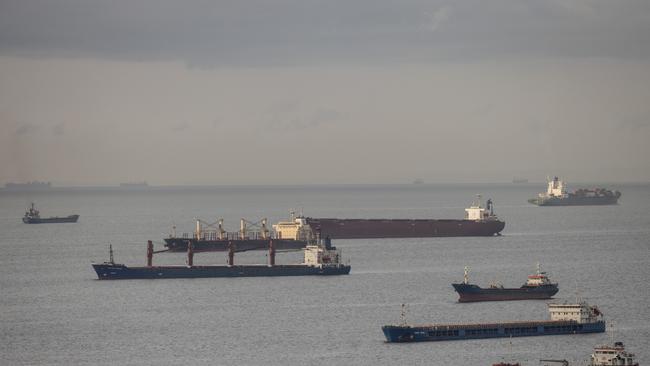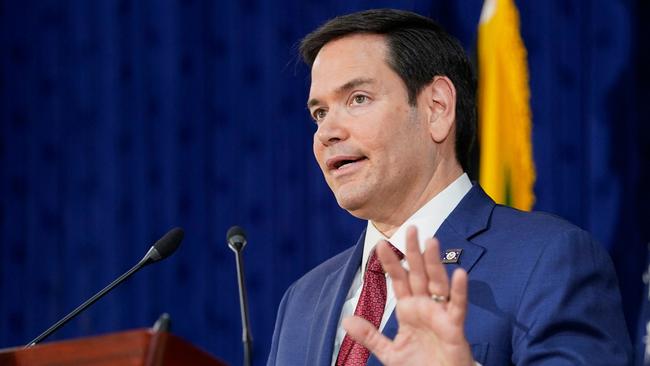Russia’s new demands signal trouble for Trump’s goal of quick end to Ukraine war
Washington and Moscow issue sharply different statements at the end of talks over Black Sea.

To see how difficult negotiating a quick peace deal between Russia and Ukraine will be, look no further than this week’s effort to reach an agreement on the Black Sea.
Washington had reason to hope for a faster Black Sea deal between Russia and Ukraine. The two sides, after all, had held extensive discussions on the topic in the first year of the war. But the US and Russia issued sharply different statements at the end of the talks this week, with Moscow making demands for sanctions relief that Washington alone can’t satisfy.
A promised ceasefire on energy infrastructure, meanwhile, has shown little evidence of taking hold in the war. Russia and Ukraine have continued striking each others’ territory daily, while accusing each other of violating the truce.
Russia is pushing for tough concessions as it drives ahead on the battlefield—and the talks are only going to get more difficult from here.
For President Trump, “the problem is how to continue to portray these steps as successes,” said Thomas Graham, a distinguished fellow at the Council on Foreign Relations, and a national security adviser on Russia during the George W. Bush administration. “The closer you look, there’s less to this agreement than meets the eye.”
The US statement stressed how Washington and Moscow agreed on a ceasefire and trade. Moscow noted a number of agreements reached in talks, and then listed numerous conditions before anything could be implemented—among them a lifting of sanctions imposed by Europe.
Secretary of State Marco Rubio acknowledged the difficulty Wednesday, saying that the talks over a ceasefire in the Black Sea were still exploratory—and that the US wasn’t able to fulfill some of the Russian demands.
“Some of those conditions include sanctions that are not ours—they belong to the European Union,” he said on a diplomatic trip to Kingston, Jamaica.

European officials have put it more bluntly. Speaking on Thursday after hosting a meeting of mainly European leaders to discuss security guarantees for Ukraine, French President Emmanuel Macron praised Trump’s peace push but said it is hard to describe the Saudi talks as serious peace talks.
“It is quite difficult to conclude that there are peace negotiations when these parallel talks have led to three distinct statements which say three different sets of things: a Ukrainian-US statement, a Russian-US statement and a Russian statement which is different again from the other ones,” he told reporters. “This situation creates lots of uncertainty.”
Rubio said that in the coming days the Trump administration would go through the proposals and try to more fully understand what the Russian position is. Then, he said, the Russian asks will be brought to Trump, “who will ultimately make a decision about what the next step is here.”
Rubio’s description of talks in Saudi Arabia that took place earlier this week contrasted with a White House readout that portrayed broad progress between Moscow and Kyiv toward a cessation of hostilities.
The Trump administration has so far sought to notch some easier wins in a phased approach toward ending the conflict. Though Trump aides touted tentative agreements over energy infrastructure and the Black Sea as accomplishments by the world’s greatest dealmaker, they were in fact deals previously discussed by Moscow and Kyiv.
“These things were taken off the shelf almost ready-made, and that might make them easier to implement on some level but things are still incredibly difficult,” said Samuel Charap, a senior political scientist at Rand, a nonprofit global-policy think tank.
The first deal between the US and Russia was meant to protect the energy infrastructure of both countries from attack, drawing from extensive talks last year in Qatar. At that time, the two sides spent weeks working out details of an agreement until Ukrainian forces crossed into Russia’s Kursk region, causing the Russians to withdraw from talks and reject any agreement.
Likewise, the prospect of Black Sea security was discussed at length in the first year of the war when Turkey and the United Nations worked out the Black Sea Grain Initiative with the two sides. It eventually fell apart after Russia said it wasn’t helping Moscow boost its grain exports.

At that time, the prospect of lifting sanctions on Russia’s Agricultural Bank, Rosselkhozbank, was brought up, and the UN even said it had offered a work around for the bank. Russia ultimately pulled out of the agreement, but Ukraine’s ability to neutralize Russia’s Black Sea fleet gave Kyiv some ability to still move its grain relatively unhindered from port.
This time around, the US can lift its own sanctions on Rosselkhozbank and restore dollar trade, but it doesn’t have the authority to unilaterally reinstate Russian banks into the Swift financial network, a step Russia has demanded before promising to ensure security on the Black Sea, said Scheherazade S. Rehman, the director of the European Union Research Center at George Washington University in Washington, DC.
“In a bid to broker an end to the war in Ukraine, the Trump administration has signaled a willingness to enter talks on easing a suite of economic sanctions,” she said. But “the US cannot single-handedly lift Swift sanctions.”
Given that past ceasefires in Ukraine have failed to halt fighting, the US should expect slow progress on establishing a suspension of hostilities. But Trump’s push to reach a deal quickly has made his negotiators vulnerable to Russian demands, often at the expense of the Ukrainian position.
“Getting here was difficult and even this is not a done deal,” said Charap. “It only gets harder from here.”
The Wall Street Journal





To join the conversation, please log in. Don't have an account? Register
Join the conversation, you are commenting as Logout